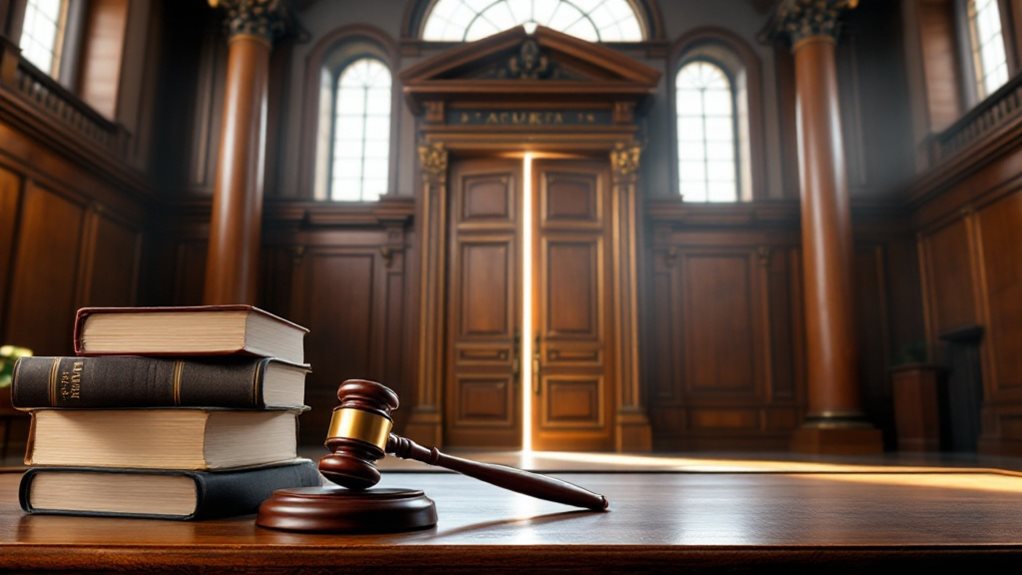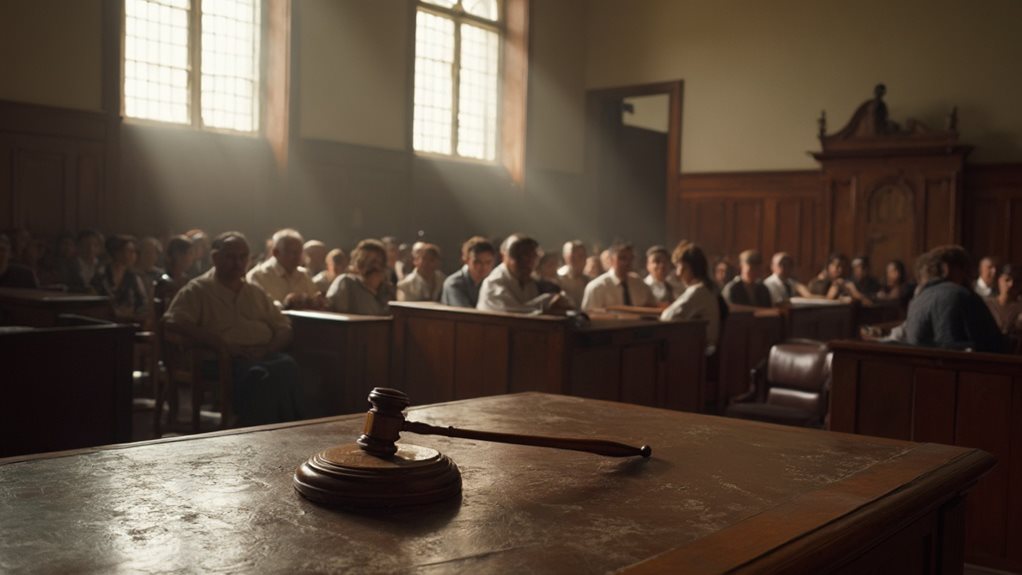
Legal order establishes societal foundations by ensuring fairness and lawful conduct to foster safety and social harmony. It forms the base upon which rights and responsibilities balance individual freedoms with collective needs, while transparent legal processes build community trust. As a mechanism for conflict resolution, legal order utilizes structured principles and mediation strategies. This intricate design enhances civic engagement and accountability, hinting at deeper insights into the profound effects these structures have on sustaining community development.
Key Takeaways
- Legal order ensures societal stability by enforcing laws that promote peace and prevent conflicts.
- Transparency in legal processes builds trust between citizens and authorities, enhancing compliance.
- Education on rights and responsibilities fosters a culture of legal literacy and civic engagement.
- Conflict resolution mechanisms contribute to societal coherence by mediating disputes effectively.
- Community accountability is reinforced through clear delineations of legal boundaries and consequences.
Understanding the Foundations of Legal Frameworks

Understanding the foundations of legal frameworks is vital because they establish the principles of fairness, accountability, and righteousness that underpin societal order.
A robust understanding of these frameworks enhances legal literacy, which is fundamental for effective participation within the justice system. Through meticulous law interpretation and rights enforcement, citizens and institutions cultivate a compliance culture critical for maintaining social harmony.
Equitable treatment, a core tenet of justice, is guaranteed through transparent and accountable legal processes. Consequently, the intricate relationship between legal principles and societal norms not only supports but actively promotes a fair, just, and orderly community.
The Interplay of Rights and Responsibilities in Society
The interplay between rights and responsibilities provides a structural backbone for a just society, building upon the foundational legal frameworks previously discussed.
Rights education is essential as it informs citizens of their entitlements and protections under the law, fostering a culture of respect and legal compliance.
Simultaneously, responsibility awareness guarantees that individuals understand their duties to others and the broader community, promoting civic engagement and ethical behavior.
This dual emphasis on rights and responsibilities not only balances individual freedoms with collective needs but also enhances societal harmony and legal adherence, vital for maintaining order and justice within the community.
The Role of Law in Fostering Community Accountability

As laws are established to delineate boundaries of behavior and consequence, their role in cultivating community accountability cannot be overstated.
The fabric of society is strengthened through such frameworks, ensuring that individuals not only uphold their obligations but also engage actively in civic life. This structured approach fosters a culture of ethical governance and justice awareness.
Key Elements of Law in Community Accountability:
- Enhancing Community Trust: Laws promote transparency and fairness, essential for sustaining community trust and cooperation.
- Promoting Civic Participation: Legal frameworks encourage active participation in societal governance, enhancing social accountability.
- Strengthening Law Compliance: Effective laws and their enforcement foster an environment where community responsibility and law compliance are the norms.
Legal Order as a Catalyst for Peace and Safety
Building on the role of law in fostering community accountability, it is equally significant to contemplate how legal order serves as a foundational element for peace and safety.
Legal safeguards enforce safety protocols that contribute to peaceful coexistence and social stability. Law enforcement plays a critical role in conflict prevention, actively promoting community resilience.
Additionally, trust building through transparent legal processes fosters a cooperative relationship between citizens and authorities. This synergy not only enhances adherence to the law but also nurtures an environment where safety and peace are maintained, paving the way for a harmoniously structured society.
Enhancing Decision-Making With Structured Legal Principles

Understanding structured legal principles greatly enhances decision-making processes, particularly in complex contexts where clarity and precision are paramount.
These principles provide a foundation for structured reasoning, enabling parties to make informed choices based on sound legal understanding.
Here's how structured legal principles facilitate superior decision-making:
- Standardization: Guarantees consistency and fairness in application, reducing arbitrary interpretations.
- Predictability: Helps anticipate legal outcomes, fostering a stable legal environment.
- Transparency: Promotes openness in the decision-making process, enhancing trust and compliance among stakeholders.
Conflict Resolution Techniques and Legal Order
Structured legal principles not only streamline decision-making but also lay a solid foundation for effective conflict resolution within legal frameworks.
Mediation strategies and facilitative techniques are employed to overcome communication barriers, fostering consensus building through enhanced negotiation skills. The emotional intelligence of the mediators plays an essential role in managing interpersonal dynamics, vital for restorative justice.
Additionally, arbitration processes provide a structured approach to dispute resolution, ensuring that all parties are heard in a controlled, respectful environment.
This systematic application of conflict resolution methodologies underpins the stability and coherence of legal order, ultimately contributing to a more harmonious society.
The Impact of Legal Order on Community Development

As legal order solidifies within a community, it greatly enhances the prospects for sustainable development. The implementation of a structured legal framework fosters an environment where civic responsibility and public trust flourish.
This transformative effect on community development can be articulated through several critical aspects:
- Economic Stability: Legal order promotes an environment conducive to investment and business growth, enhancing economic stability and equitable access to opportunities.
- Social Justice: Strengthened legal literacy underpins efforts towards social justice, ensuring community engagement in fostering equitable practices.
- Community Resilience: A robust legal system builds community resilience, enabling effective response and adaptation to challenges, thereby securing long-term development.
Steering through legal challenges is integral to furthering the goals of a just society, building on the foundation of community development strengthened by legal order.
Maneuvering these challenges requires a precise understanding of legal navigation principles and a commitment to societal justice. Effective challenge resolution hinges on robust legal education and a proactive stance in justice advocacy.
Such efforts guarantee the protection of rights and foster legal awareness among citizens. As society confronts these legal hurdles, the collective endeavor must focus on equitable solutions that uphold the integrity of the legal framework and promote a truly just societal structure.
Frequently Asked Questions
How Can Legal Frameworks Adapt to Rapid Technological Advancements?
Legal frameworks can adapt to rapid technological advancements through regulatory innovation and technology integration, ensuring laws remain relevant and effective in governing new digital landscapes while protecting rights and fostering accountability.
What Role Do Cultural Differences Play in Shaping Legal Systems?
Cultural differences form the mosaic from which legal systems are crafted, influencing through cultural perceptions and fostering legal pluralism. These differences shape laws, ensuring they resonate with the varied moral fabrics of society.
How Does Legal Order Influence Personal Freedom and Privacy?
Legal order shapes personal freedom by balancing personal autonomy with societal norms, while privacy rights are protected through specific legal provisions, which collectively influence individual liberty and societal expectations in a precise, analytical manner.
What Are the Ethical Considerations in Enforcing Legal Frameworks?
Ethical considerations in enforcing legal frameworks include addressing ethical dilemmas and maintaining a justice balance. These involve weighing principles of fairness against practical enforcement issues while ensuring rights and responsibilities are justly upheld.
How Do International Laws Interact With Domestic Legal Systems?
International laws often tower over domestic legal landscapes, guiding treaty implementation amid jurisdictional conflicts. Their interaction shapes legal systems through a scholarly dance of influence, ensuring domestic laws align with global legal standards.
Conclusion
In the shadow of the ancient Roman Forum, where legal concepts first crystallized, modern societies continue to evolve under the steadfast gaze of legal order. Here, as in those historic assemblies, the legal framework operates as the spine of societal body—supporting, protecting, and enabling movement toward greater justice and harmony. The empirical evidence is clear: societies with strong legal orders exhibit lower crime rates and higher levels of civic engagement, underpinning the timeless truth that law is the bedrock of civilization.

